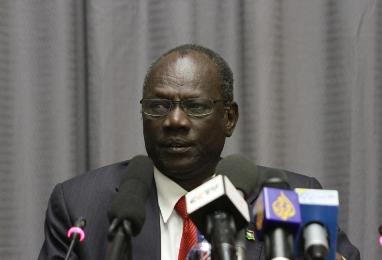IGAD did not ask Kiir’s government to revoke 28 states: official
February 3, 2016 (JUBA) – South Sudanese government has denied having told by East African regional bloc, the Intergovernmental Authority on Development (IGAD), to revoke the unilaterally created 28 states in violation of the peace agreement it signed with opposition factions in August 2015 on the basis of the existing 10 states, saying it was a misinterpretation.

“IGAD communiqué did not ask to revoke the 28 states,” Michael Makuei Lueth, minister of information, spokesman of the government and deputy chief negotiator for the government told reporters on Wednesday in broadcasted statement on the state-run South Sudan Television (SSTV).
He said the communiqué instead asked the parties to continue to dialogue on the matter of the 28 states, after formation of transitional government. Lueth went ahead to read to reporters point 6 of the IGAD communiqué, which reads:
“Concerned by the recent decision of the Government of South Sudan to implement the October 2, 2015 Presidential Decree on the creation of 28 new states, given that such action is insistent with the terms of ARCSS [Agreement on Resolution of Conflict in South Sudan]. However, Council underlined that this should not delay the formation of the Transitional Government of National Unity (TGoNU) and urges the rapid formation of the TGoNU to enable dialogue on this matter.”
The communique called on the parties, the government, the armed opposition faction of the Sudan People’s Liberation Movement (SPLM-IO) led by former Vice President, Riek Machar, and other partners in peace, to instead form a boundary commission with membership of all the parties to the peace agreement and review the process for creation of new states.
“Urges the Parties, subsequent to the formation of TGoNU at national level, in the absence of agreement on the creation of new states, to suspend further action implementing the operationalization of new states until an inclusive, participatory National Boundary Commission comprising all parties to ARCSS reviews proposed states and their boundaries, and that this review process occur, for a period of up to one month,” reads point 12 in the communique.
The statement further said in case the parties to the agreement will not agree on proposed states, they will “revert” to the provisions of the agreement which is based on 10 states.
“Indicates to the Parties that in the event there are outstanding disputes at the end of the boundary review process, the Parties should revert to the provisions of the Agreement,” reads point 13.
Lueth could not however explain to the reporters what the communiqué meant to “suspend” the operationalization of 28 states, which is described as “inconsistent” with the provisions of the peace agreement.
Observers say the suspension does clearly mean the 28 states have become defunct, their operationalization to establish their governments is therefore frozen and the newly appointed governors are as well suspended until all the parties reach a consensus on a number of new states to create.
Also the decision that in case the parties will not agree on the number of states to be created during the upcoming dialogue within membership of the boundary commission, the parties shall revert to the existing 10 states.
The decision, they say, has undoubtedly brought to an end the 28 states, arguing that it is obvious the parties will not agree on the 28 states and may reduce or increase the number, redraw their boundaries, or simply revert to 10 states.
(ST)
